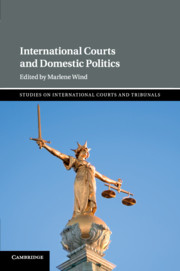Book contents
- International Courts and Domestic Politics
- Studies on International Courts and Tribunals
- International Courts and Domestic Politics
- Copyright page
- Contents
- Figures
- Tables
- Contributors
- Abbreviations
- Preface
- Introduction
- 1 ‘Missing in Action? The Rare Voice of International Courts in Domestic Politics’
- Part I
- 2 What Can Financial Markets Tell Us about International Courts and Deterrence?
- 3 The Strasbourg Court and Domestic Judicial Politics
- 4 It’s a Good Idea … Isn’t It? The Impact of Complementarity at the International Criminal Court on Domestic Law, Politics and Perceptions of Sovereignty
- 5 Rights-Protecting iCourts: The Curious Case of the OP-ICESCR
- 6 Reassembling the French State via Human Rights: Between Human Rights Internationalism and Political Sovereignism
- 7 Impact through Trust: The CJEU as a Trust-enhancing Institution
- Part II
- Index
- References
2 - What Can Financial Markets Tell Us about International Courts and Deterrence?
from Part I
Published online by Cambridge University Press: 23 June 2018
- International Courts and Domestic Politics
- Studies on International Courts and Tribunals
- International Courts and Domestic Politics
- Copyright page
- Contents
- Figures
- Tables
- Contributors
- Abbreviations
- Preface
- Introduction
- 1 ‘Missing in Action? The Rare Voice of International Courts in Domestic Politics’
- Part I
- 2 What Can Financial Markets Tell Us about International Courts and Deterrence?
- 3 The Strasbourg Court and Domestic Judicial Politics
- 4 It’s a Good Idea … Isn’t It? The Impact of Complementarity at the International Criminal Court on Domestic Law, Politics and Perceptions of Sovereignty
- 5 Rights-Protecting iCourts: The Curious Case of the OP-ICESCR
- 6 Reassembling the French State via Human Rights: Between Human Rights Internationalism and Political Sovereignism
- 7 Impact through Trust: The CJEU as a Trust-enhancing Institution
- Part II
- Index
- References
Summary
Can international courts deter? Much scholarship relies on the answer being ‘yes’. In this view, the rulings of international courts are thought to have effects beyond a given case, changing global expectations over the measures ruled on and making further violations less likely. Yet public international law explicitly denies the possibility of such deterrence. Little empirical work assesses these competing claims. In this chapter, we describe the novel approach we have taken in our recent work, by looking to financial markets reactions to World Trade Organization rulings. We ask whether investors downgrade a firm when a policy similar to the one it benefits from has been found in violation in another country. Using a quantitative case study of rulings against Canada’s support of its solar industry, we find measured empirical support for such a deterrent effect. Yet a caveat is in order: the Appellate Body’s rulings appear to exert a greater deterrent effect than ad hoc panellists. The debate over the deterrence effects of courts remains open. Yet our findings suggest that financial markets appear willing to bet on courts deterring similar violations in countries not party to a dispute.
- Type
- Chapter
- Information
- International Courts and Domestic Politics , pp. 45 - 70Publisher: Cambridge University PressPrint publication year: 2018

